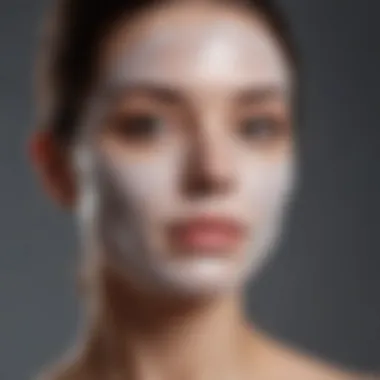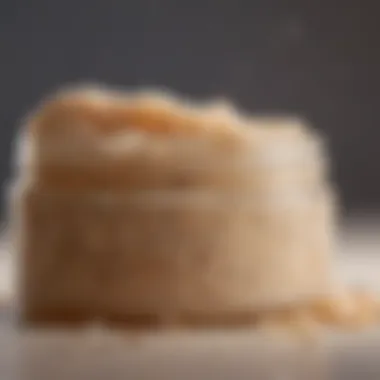Effective Solutions for Dry Patches on the Face - Achieve Healthy Skin


Insider Beauty Tips
When dealing with dry patches on the face, it's essential to implement effective skincare remedies to achieve a healthy and hydrated complexion. These patches can be troublesome, but with the right techniques and products, you can restore moisture to your skin and bid farewell to flaky areas. From natural remedies 🌿 to specialized skincare products 🧴, there are various solutions to soothe dryness and nourish your skin. Let's delve into some insightful beauty hacks and skincare tips to combat dry patches effectively.
Beauty Hacks
To combat dry patches on the face, incorporating hydrating elements into your skincare routine is crucial. Hyaluronic acid serums and moisturizers with ceramides can help lock in moisture and rebuild the skin's barrier. Additionally, using gentle exfoliants like lactic acid or enzymes can aid in removing dry, flaky skin cells, promoting a smoother complexion. It's also essential to hydrate from within by drinking an adequate amount of water and incorporating omega-3 rich foods into your diet for improved skin health.
Skincare Tips
For individuals struggling with dry patches, it's advisable to avoid harsh soaps and cleansers that can strip the skin of its natural oils. Opt for gentle, hydrating cleansers that maintain the skin's moisture balance. Incorporating a humectant-rich moisturizer containing ingredients like glycerin and hyaluronic acid can help attract and retain moisture in the skin, combating dryness effectively. Don't forget the importance of using a broad-spectrum sunscreen daily to protect your skin from further damage caused by environmental stressors.
Haircare Secrets
While focusing on the face, it's vital not to overlook the connection between haircare and skin health. Dry patches can sometimes be a result of product buildup or irritation from hair products. To prevent this, ensure to keep hair products away from your face and cleanse your hair regularly to maintain scalp health. Using silk or satin pillowcases can also help minimize friction on the skin, reducing the likelihood of developing dry patches. By incorporating these haircare secrets into your routine, you can promote overall skin health and combat dryness effectively.
Understanding Dry Patches on the Face
Dry patches on the face can be a nuisance for many individuals seeking healthy skin. Understanding the underlying causes and symptoms is crucial to implementing effective remedies. This section delves deep into the factors contributing to dry patches, shedding light on the importance of skincare routines tailored to address specific issues. By comprehending the intricate complexities of dry patches, readers can make informed decisions to improve skin health.
Causes of Dry Patches
Lack of Moisture
Lack of moisture is a significant culprit behind dry patches on the face. When the skin lacks adequate hydration, it can lead to flakiness, tightness, and redness. Incorporating moisturizing agents into daily skincare regimens can help alleviate this issue. While lack of moisture may seem like a common concern, its impact on skin health is profound. Implementing moisturizers rich in hydrating ingredients like hyaluronic acid can restore the skin's moisture barrier, promoting a radiant complexion.
Harsh Weather Conditions
Exposure to harsh weather conditions can exacerbate dry patches on the face. Extreme temperatures, high winds, and low humidity levels can strip the skin of its natural oils, causing it to become dry and irritated. Protective measures, such as using a rich moisturizer and wearing appropriate clothing to shield the face from environmental aggressors, are essential in preventing and treating dry patches induced by weather conditions.
Skin Conditions
Certain skin conditions, such as eczema or psoriasis, can manifest as dry patches on the face. These conditions require specialized care and treatment to manage symptoms effectively. Consulting with a dermatologist for a proper diagnosis and personalized skincare recommendations is crucial for individuals experiencing persistent dry patches due to underlying skin issues. By addressing the root cause of skin conditions, targeted treatments can help alleviate dryness and improve overall skin health.
Symptoms of Dry Patches
Flakiness
Flakiness is a common symptom of dry patches, characterized by the presence of dry, peeling skin. This texture irregularity can be both unsightly and uncomfortable, prompting individuals to seek solutions for smoother, more hydrated skin. Exfoliating agents, such as gentle scrubs or chemical exfoliants, can help slough off dead skin cells and encourage cell turnover, reducing flakiness and promoting a smoother skin surface.
Tightness
The sensation of tightness on the face is indicative of dry patches, signaling a lack of moisture and hydration. To mitigate this discomfort, incorporating hydrating serums or masks enriched with nourishing ingredients like ceramides and glycerin can restore moisture levels and alleviate tightness. By replenishing the skin's moisture reserves, tightness can be alleviated, restoring comfort and suppleness to the skin.
Re dness


Redness accompanying dry patches often signifies inflammation and skin sensitivity. This common symptom can be exacerbated by external factors like harsh skincare products or environmental aggressors. Utilizing gentle, soothing skincare products formulated for sensitive skin types can help reduce redness and calm irritation. Ingredients like chamomile extract or centella asiatica can provide anti-inflammatory benefits, minimizing redness and creating a more even complexion.
Home Remedies for Dry Patches:-
This section delves into the importance of utilizing natural remedies to combat dry patches on the face. In a world inundated with synthetic skincare products, the allure of natural remedies lies in their ability to nourish the skin without harsh chemicals. Home remedies offer a holistic approach to skincare, addressing not just the symptoms but also the underlying causes of dry patches. By incorporating easily accessible ingredients like natural oils, masks, and moisturizers into one's skincare routine, individuals can soothe dryness, restore moisture, and promote overall skin health.
Natural Oils:-
Coconut Oil:-
Coconut oil, extracted from the kernel of coconuts, serves as a versatile and popular choice for skincare due to its rich emollient properties. Its key characteristic lies in its ability to deeply penetrate the skin, providing intense hydration and nourishment. This natural oil is widely favored for its anti-inflammatory and antioxidant properties, making it an effective solution for dry patches. However, it's worth noting that coconut oil may not be suitable for all skin types, particularly those prone to acne or sensitivity.
Argan Oil:-
Argan oil, often referred to as 'liquid gold,' is derived from the kernels of the argan tree native to Morocco. Its standout feature is its high content of essential fatty acids and vitamin E, which promote skin repair and regeneration. This makes argan oil a popular choice for addressing dryness and restoring skin elasticity. The lightweight nature of argan oil makes it suitable for all skin types, including oily and sensitive skin.
Jojoba Oil:-
Jojoba oil, extracted from the seeds of the jojoba plant, bears a remarkable similarity to the skin's natural sebum. This unique characteristic allows jojoba oil to balance skin oil production, making it an ideal choice for hydrating dry patches without clogging pores. Its non-greasy and soothing properties make it suitable for sensitive skin, contributing to its popularity in skincare products.
Hydrating Masks:-
Honey Mask:-
Honey, a natural humectant, is a key ingredient in hydrating masks due to its ability to attract and retain moisture in the skin. Honey masks offer deep hydration and help to strengthen the skin's natural barrier, reducing moisture loss. The antimicrobial properties of honey also make it beneficial for soothing irritations and promoting skin healing. However, individuals with bee allergies should exercise caution when using honey-based masks.
Oatmeal Mask:-
Oatmeal, known for its soothing properties, is a staple in skincare for its ability to calm irritated and dry skin. Oatmeal masks provide gentle exfoliation, removing dead skin cells and promoting a smoother complexion. The anti-inflammatory compounds in oatmeal help to reduce redness and itching, making it a suitable choice for sensitive skin types.
Aloe Vera Mask:-
Aloe vera, often hailed as the 'plant of immortality,' is prized for its hydrating, soothing, and healing properties. Aloe vera masks offer instant relief to dry, irritated skin, thanks to its high water content and vitamins. This natural ingredient aids in restoring moisture, calming inflammation, and promoting overall skin rejuvenation. Despite its numerous benefits, some individuals may be sensitive to aloe vera's active compounds, prompting a patch test before use.
DIY Moisturizers:-
Shea Butter Cream:-
Shea butter cream, derived from the nut of the shea tree, is renowned for its exceptional emollient qualities. Its key characteristic lies in its ability to seal in moisture and create a protective barrier on the skin's surface, preventing transepidermal water loss. Shea butter cream is a popular choice for individuals with dry skin, offering intense hydration without clogging pores. However, those with latex allergies should exercise caution as shea butter may trigger a reaction.
Cucumber Lotion:-
Cucumber lotion, infused with cucumber extract, is prized for its cooling and hydrating properties. The key characteristic of cucumber lotion lies in its ability to refresh and revitalize the skin, making it a popular choice for soothing dry patches. The gentle nature of cucumber extract makes it suitable for all skin types, providing a burst of hydration without heaviness or greasiness.
Avocado Face Pack:-


Avocado face pack, incorporating mashed avocado, honey, and either yogurt or olive oil, offers a nourishing and moisturizing treat for the skin. Avocado's high content of vitamins, minerals, and healthy fats makes it an ideal choice for replenishing dry skin and imparting a radiant glow. The unique feature of avocado face pack lies in its ability to deeply hydrate, repair skin damage, and improve skin texture. Despite its benefits, individuals allergic to latex or avocado should refrain from using this face pack.
Skincare Products for Dry Patches
When it comes to combating dry patches on the face, the role of skincare products cannot be underestimated. These products play a crucial part in restoring moisture and maintaining skin health. From hydrating serums to moisturizing creams and exfoliating treatments, each product offers unique benefits that target dry patches effectively. By incorporating the right skincare products into your routine, you can address dryness and achieve a nourished complexion.
Hydrating Serums
Hydrating serums are specially formulated to provide intense moisture to the skin, making them ideal for tackling dry patches. Among the various types of hydrating serums available, three key variants stand out for their effectiveness:
Hyaluronic Acid Serum
Hyaluronic acid serum is renowned for its exceptional ability to attract and retain moisture in the skin. This key characteristic makes it a popular choice for individuals looking to combat dryness and enhance skin hydration. The unique feature of hyaluronic acid serum lies in its lightweight texture, which allows for easy absorption without leaving a greasy residue. While hyaluronic acid serum is a beneficial option for boosting skin hydration, individuals with sensitive skin may need to be cautious due to the risk of potential reactions.
Vitamin E Serum
Vitamin E serum is notable for its antioxidant properties and ability to nourish and repair the skin. The primary characteristic of vitamin E serum is its capacity to protect against environmental damage while promoting skin healing. This makes it a favored choice for addressing dry patches and restoring skin health. One unique feature of vitamin E serum is its versatility, as it can benefit various skin types and conditions. However, individuals with oily skin should use it sparingly to avoid excessive moisturization.
Glycerin-based Serum
Glycerin-based serums are valued for their humectant properties, which help to attract and lock in moisture within the skin. The key characteristic of glycerin-based serum is its hydrating effect, making it a popular choice for individuals with dry skin or dry patches. One unique feature of glycerin-based serum is its compatibility with most skin types, offering hydrating benefits without causing excess oiliness. Despite the advantages of glycerin-based serum, individuals with very oily skin may find it too heavy for their preferences.
Moisturizing Creams
Moisturizing creams are essential for nourishing and protecting the skin, especially in areas prone to dryness like facial patches. Within this category, several creams are particularly effective for addressing dry patches:
Ceramide-rich Cream
Ceramide-rich creams are formulated with lipid molecules that help to restore the skin's natural barrier and prevent moisture loss. The primary characteristic of ceramide-rich cream is its ability to strengthen the skin barrier, making it an excellent choice for individuals with dry, sensitive skin. One unique feature of ceramide-rich cream is its long-lasting hydration, providing continuous moisture throughout the day. Despite its benefits, individuals with oily skin may find ceramide-rich cream too rich for their liking.
Squalane Moisturizer
Squalane moisturizers are derived from squalene, a natural compound found in the skin that diminishes as we age. The key characteristic of squalane moisturizer is its lightweight texture and quick absorption, making it suitable for all skin types. One unique feature of squalane moisturizer is its non-comedogenic nature, allowing it to hydrate the skin without clogging pores. While squalane moisturizer is excellent for combating dry patches, individuals with very dry skin may require additional hydration.
Hemp Seed Cream
Hemp seed creams are packed with essential fatty acids and antioxidants that help nourish and replenish the skin. The primary characteristic of hemp seed cream is its ability to provide deep hydration and soothe dry, irritated skin. One unique feature of hemp seed cream is its anti-inflammatory properties, which can help reduce redness and calm sensitive skin. Despite its benefits, individuals with nut allergies should perform a patch test before using hemp seed cream to avoid potential reactions.
Exfoliating Treatments
Exfoliating treatments play a vital role in removing dead skin cells and allowing moisturizing products to penetrate more effectively. Among the various exfoliants available, three stand out for their ability to target dry patches:
Glycolic Acid Exfoliator
Glycolic acid exfoliators are chemical exfoliants that work to dissolve dead skin cells and promote skin renewal. The key characteristic of glycolic acid exfoliator is its ability to exfoliate the skin gently, making it suitable for individuals with sensitive skin prone to dryness. One unique feature of glycolic acid exfoliator is its effectiveness in improving skin texture and tone, resulting in a brighter complexion. While glycolic acid exfoliator is beneficial for dry patches, individuals with very sensitive skin should use it cautiously to avoid irritation.


Lactic Acid Peel
Lactic acid peels are mild chemical peels that help to exfoliate the skin gently and improve moisture retention. The primary characteristic of lactic acid peel is its exfoliating properties combined with hydration benefits, making it a versatile choice for individuals with dry patches. One unique feature of lactic acid peel is its ability to enhance skin elasticity and promote collagen production, leading to smoother, firmer skin. Despite its advantages, individuals with extremely dry or damaged skin may experience tingling or redness when using lactic acid peel.
Enzyme Scrub
Enzyme scrubs rely on natural enzymes to slough off dead skin cells and reveal a brighter, smoother complexion. The key characteristic of enzyme scrub is its gentle exfoliation without abrasive particles, making it suitable for sensitive skin types prone to dry patches. One unique feature of enzyme scrub is its ability to provide enzymatic exfoliation, which is milder than traditional mechanical scrubs. While enzyme scrub is effective for removing dead skin cells, individuals with allergies to specific enzymes should check the product's ingredients to prevent adverse reactions.
Lifestyle Changes for Healthy Skin
In this article, the focus shifts towards elucidating the significant role of lifestyle changes in fostering healthy skin. Emphasizing the importance of adopting specific elements like hydration, nutrition, protective measures, and stress management can be transformative for skin health. By incorporating lifestyle changes, individuals can address underlying issues causing dry patches and enhance skin resilience against environmental stressors.
Hydration
Increase Water Intake
Increasing water intake stands as a pivotal aspect in the realm of healthy skin. The key characteristic of augmenting water consumption lies in its ability to improve skin's hydration levels from within. This choice proves particularly beneficial for combating dry patches on the face as adequate hydration supports skin elasticity and suppleness. The unique feature of increasing water intake is its natural and cost-effective method that promotes overall skin health and aids in the maintenance of a glowing complexion.
Limit Alcohol and Caffeine
Limiting alcohol and caffeine intake plays a crucial role in promoting skin health. By reducing the consumption of these dehydrating substances, individuals can prevent further exacerbation of dry patches on the face. The key characteristic of this restriction is its effectiveness in maintaining skin hydration and preventing moisture loss. Limiting alcohol and caffeine intake serves as a popular choice within this article due to its notable impact on skin's overall wellbeing. One must note the disadvantages of excessive alcohol and caffeine consumption, as they can lead to skin dehydration and exacerbate existing dryness.
Nutrition
Omega-3 Fatty Acids
Omega-3 fatty acids contribute significantly to overall skin health and play a vital role in addressing dry patches. The key characteristic of Omega-3 fatty acids is their anti-inflammatory properties, which can help reduce skin irritation and redness associated with dryness. This component proves to be a popular choice in this article due to its ability to nourish the skin from within, promoting a healthy and radiant complexion. Individuals should consider the advantages of incorporating Omega-3 fatty acids into their diet for improved skin texture and hydration levels.
Vitamins A and E
Vitamins A and E are essential nutrients that contribute to skin repair and maintenance. The key characteristic of these vitamins is their antioxidant properties, which protect the skin from environmental damage and aid in cell regeneration. Their inclusion in this article is justified by the significant benefits they offer in combating dry patches and promoting skin rejuvenation. While these vitamins are advantageous for skin health, individuals should be mindful of potential disadvantages such as allergic reactions or interactions with other medications.
Protective Measures
Use Humidifiers
Integrating humidifiers into living spaces can positively impact skin moisture levels. The key characteristic of humidifiers is their ability to add moisture to the air, preventing skin dryness caused by low humidity environments. This choice is beneficial for individuals seeking to maintain optimal skin hydration and prevent dry patches from forming. While using humidifiers is a popular choice within this article, individuals should be cautious of potential disadvantages like mold growth in humid conditions.
Avoid Hot Showers
Avoiding hot showers is imperative for preserving skin hydration and minimizing dry patches. The key characteristic of this practice is its ability to protect the skin's natural oils, preventing moisture loss and skin damage. This choice is deemed beneficial for individuals aiming to maintain healthy skin and combat dryness effectively. While avoiding hot showers is a preferred option discussed in this article, individuals should consider the drawbacks, such as the discomfort of cold showers for some individuals and the challenges in adjusting to temperature changes.
Stress Management
Meditation
Incorporating meditation into daily routines can significantly impact skin health and alleviate stress-related skin issues. The key characteristic of meditation is its ability to reduce stress hormones, which can trigger skin reactions like dry patches and redness. This practice is a beneficial choice within this article due to its calming effects on both the mind and body, promoting overall skin wellness. Individuals can benefit from the advantages of meditation for improving skin clarity and reducing inflammation, although it may pose challenges for those unfamiliar with meditative practices.
Yoga
Practicing yoga offers a holistic approach to stress management and skin health. The key characteristic of yoga lies in its combination of physical postures, breathing techniques, and mindfulness practices that promote relaxation and reduce stress levels. This practice is deemed beneficial for individuals seeking a comprehensive solution for combating dry patches and enhancing skin vitality. While yoga is a popular choice in this article for stress management, individuals should be mindful of potential disadvantages such as the time commitment required for regular practice and the need for guidance from experienced instructors.







